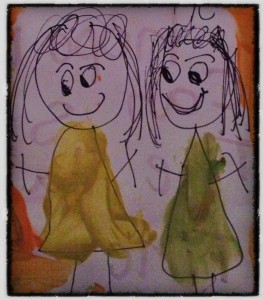Dear Beatrix,
Do you know I’m your bestest bestest friend? I hope we can have another play date or even have a sleepover. I hope we have fun at school today. Should we have a sleepover at my house or your house? Maybe at the sleepover we can watch a movie.
Maybe you and me can have a race outside today. We will race from the place where we line up to go into the playground to the place we get out of the playground. I will say “on your mark, get set, go!” and whoever wins will get my special treat.
I hope we can play together outside besides the race, like hide and seek or hopscotch. I hope we can get together and play. Maybe even sleepover for two nights and I can come to school with you.
Sincerely,
Emilia
Emilia wrote this letter, a few years ago. It was to her then-best friend, Beatrix. She labored over all of the words – on a keyboard, because she wanted it ‘to look important’ – asking for help with ‘the spellings’ and making sure that she said everything that she needed to say and that she got every word just right. Because she wanted it to be special, for Beatrix.
I read it a dozen times if I read it once, and every time, I cried. I cried because her love for Beatrix is so simple and so deeply felt. I cried because her experience of friendship was so pure. I cried because, oh, to have the heart of a seven year old.
Oh, to view life through the lens of questions like, when shall we play? Where shall we race? Who shall bring the treats?
Aristotle distinguished between three forms of friendship, or rather, three bases of friendship: friendship based on utility, friendship based on pleasure, and friendship based on good, or virtue. In the first case, friends love one another for what they can do or provide for one another, in terms of what is good for themselves; in the second, friends love one another for the pleasure that they bring to each other, based on what is pleasant for themselves. In both, the love is self-facing; the measure of what is good is one’s personal experience – what is good for oneself.
But in the third form of friendship, in what Aristotle calls ‘complete friendship’ – friendship based on the good, fully understood – that friendship is for the sake of the good in itself. That is, it’s a friendship in which friends love one another for the good that they bring each other, in terms of the complete good. Not what is usefully good for themselves, or pleasurable good for themselves (although this third form of friendship does contain these things), but what is truly good for each other. It is friendship “between people who are good and are alike in virtue, since they wish for good things one for another in the same way insofar as they are good, and they are good in themselves” (Nichomachean Ethics, Sachs transl.) It is friendship between good people, wishing good for each other, and achieving happiness in that good.
Children, obviously, can’t wholly orient themselves to the good (classically understood), because they’re not intellectually mature enough to understand, in any reflective sense, the concept of the good-in-itself. But I think that they do have a sub-reflective, emotional understanding of that good, and so in their friendships – however fleeting, however juvenile – live out a very raw, very roughly immanent experience of good-in-itself, and so experience a very simple form of complete friendship, one that is some ways more pure for being sub-reflective, if less perfect – in the Aristotelean sense – for that sub-reflectivity. It is the friendship of just wishing to run and play, of wishing to be near to each other, of wishing to bring joy to one another, of wishing to experience joy together.
It is a friendship that is so hard to experience in adulthood, at least in modern adulthood, or adulthood in the condition of modernity, wherein we are so very concerned with utility and pleasure. Wherein some friendships are deep but fleeting, and others are shallow but long-lived. It is tempting to say something about how this has worsened in the age of the Internet, during which time friendship has yielded to ‘friending’, but I’m not entirely convinced that this is true. I’ve received much comfort and support from my online friendships; more importantly (because ‘comfort and support’ might be regarded as matters of utility, as self-facing goods), they have been sources of the kind of unrestrained joy that my daughter seems to experience with her friends (we play, we race, we share our treats.) Again, these might be regarded as self-facing goods – aren’t these just different forms of pleasure? – but I prefer to think of this as joyful in the purest sense, in the sense of the experience that extends out beyond one’s self (that is only fully felt if it extends beyond one’s self.) All of which is to say – putting aside the meat of the argument for another time – that I have experienced what I think is something close to complete friendship online. But it’s still virtual friendship, for the most part, which means that the sleepovers and playground races and hopscotch tournaments – or their grown-up equivalents – are thin on the ground.
Our day-to-day relationships are more likely to be utilitarian than they are to be friendships based on a shared experience of the Good, or even just a shared investment in one another’s joy (if these are, in fact, different things.) Which isn’t to say that they’re not of value, just that they don’t lift the heart and the soul. We need to have our souls elevated. We need to lean toward happiness in the fullest sense, the Aristotelean sense, in the sense of eudaimonia, or wellness of spirit. We need to strive toward complete friendships, wherever we might find them. We need to find and keep those friends, and let those friends know that they are such friends (did you know that you are my bestest bestest friend?) and then challenge them to races, at the end of which are treats.
These are the friendships for keeping.
Emilia wrote that letter just over three years ago. Since then, we’ve moved, and she has made new best friends. Beatrix is, to some extent, only a memory. But Emilia’s friendships still have the spirit of complete friendships, the spirit of her friendship with Beatrix. Still, though – I watch, and I worry. When will her friendships grow up, in the ways that cause them to thin out, to become superficial? Or is not necessarily true that this must happen? Is it possible that she can somehow hang onto this spirit of companionable joy? Is it possible that she might grow up while still remembering, with her very best friends, how to play?
Maybe. I hope so.
Reposted/repurposed because I’ve been thinking a lot about friendship and love and connection and the people who make life richer. You know who you are.







